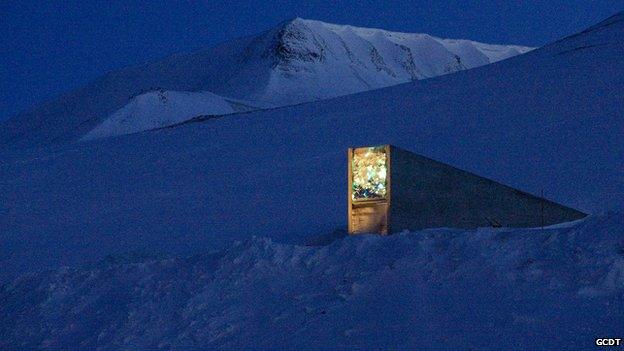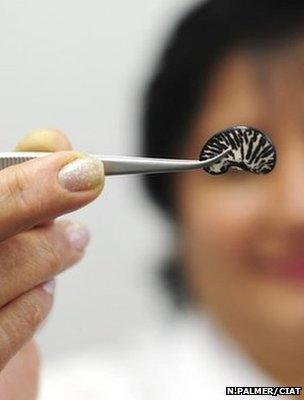Key food crops head to Arctic 'doomsday vault'
- Published

The vault's remote location in the Arctic Circle means there is very little need for human intervention
More than 20,000 crops from more than 100 nations have arrived at a "Doomsday vault" in the Arctic Circle.
The latest delivery coincides with the sixth anniversary of the frozen depository in Svalbard, which now houses more than 800,000 samples, external.
The shipment includes the first offering from Japan, where collections were threatened by the devastating earthquake and tsunami in 2011.
The facility is designed to withstand all natural and human disasters.
Deep inside a mountain on a remote island in the Svalbard archipelago - located halfway between mainland Norway and the North Pole - the vault, which cost £5m (US $7m) and took 12 months to build, offers permanent protection for the world's food crops, say its operators.
The purpose of the depository, owned by the Norwegian government and maintained by the Global Crop Diversity Trust (GCDT) and the Nordic Genetic Resources Center, is to store duplicates of all seed samples from crop collections around the world.

The GCDT says permafrost and thick rock ensure that, even in the case of a power cut, the seed samples will remain frozen.
"The vault can therefore be considered the ultimate insurance policy for the world's food supply," it adds.
"It will secure, for centuries, millions of seeds representing every important crop variety available in the world today."
The Japanese barley samples were provided by the Barley Germplasm Center at Okayama University.

National seed collections around the world have provided the samples being stored in the vault
Prof Kazuhiro Sato from the university's Institute of Plant Science and Resources said experts became concerned about the long-term safety of the national collection following the 2011 earthquake and tsunami that caused widespread devastation.
"If something bad happened to our genebank, these resources could be damaged permanently," he said.
"Barley is very important not just for Japan but for the food security of the world - we have varieties that are productive even in dry conditions and in saline soil."
Speaking ahead of a meeting at the Svalbard Global Seed Vault, GCDT executive director Marie Haga said: "Our annual gatherings at the seed vault are a sort of Winter Olympics of crop diversity, only we are not competing against each other but against the wide array of threats - natural and man-made - ranged against the diversity of food crops, diversity that is so crucial to the future of human civilisation."
She added: "We are particularly excited to be welcoming our first seed deposits from Japan, which has been very active globally in the preservation of a wide array of crop species."
- Published11 October 2012